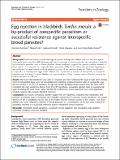Por favor, use este identificador para citar o enlazar a este item:
http://hdl.handle.net/10261/196512COMPARTIR / EXPORTAR:
 SHARE SHARE
 CORE
BASE CORE
BASE
|
|
| Visualizar otros formatos: MARC | Dublin Core | RDF | ORE | MODS | METS | DIDL | DATACITE | |

| Título: | Egg rejection in blackbirds Turdus merula: A by-product of conspecific parasitism or successful resistance against interspecific brood parasites? |
Autor: | Ruiz-Raya, Francisco; Soler, Manuel; Roncalli, Gianluca; Abaurrea, Teresa; Ibáñez-Álamo, Juan Diego | Palabras clave: | Egg recognition Conspecific brood parasitism Egg rejection Common blackbird Interspecific brood parasitism Successful resistance |
Fecha de publicación: | 12-abr-2016 | Editor: | BioMed Central | Citación: | Frontiers in Zoology 13: 16 (2016) | Resumen: | [Background] Traditional theory assumes that egg recognition and rejection abilities arise as a response against interspecific brood parasitism (IBP). However, rejection also appears in some species that are currently not exploited by interspecific parasites, such as Turdus thrushes. Recent evidences suggest that rejection abilities evolved in these species as a response to conspecific brood parasitism (CBP). To test these two alternative hypotheses, we performed an experimental study by parasitizing nests of the common blackbird (Turdus merula) with conspecifics or heterospecific eggs under different risk of parasitism (presence of interspecific or conspecific parasites near the nest). Common blackbird is a potential host of the common cuckoo (Cuculus canorus) but suffers low levels of CBP too. [Results] We found that blackbirds were able to recognize and eject heterospecific eggs at high rates whereas most of conspecifics eggs were not recognized and, therefore, accepted. Ejection rates of conspecific eggs did not exceed 13 %, even in situations of high risk of CBP (blackbird female placed near the nest), which contradict the main prediction derived from the CBP hypothesis. Conversely, ejection rates of experimental eggs simulating IBP were much higher (80-100 %). Furthermore, female blackbirds were more aggressive towards cuckoos than towards blackbird dummies. [Conclusions] Our results considered together support the IBP hypothesis, indicating that recognition and rejection of parasitic eggs in blackbirds have probably evolved due to previous cuckoo parasitism. The current absence of IBP in blackbirds may be due to the highly efficient rejection abilities in this species. Thus, these abilities have been retained in absence of brood parasitism as a consequence of the low costs involved for blackbirds, resulting in a successful resistance against interspecific brood parasitism. |
Versión del editor: | https://doi.org/10.1186/s12983-016-0148-y | URI: | http://hdl.handle.net/10261/196512 | DOI: | 10.1186/s12983-016-0148-y | E-ISSN: | 1742-9994 |
| Aparece en las colecciones: | (EBD) Artículos |
Ficheros en este ítem:
| Fichero | Descripción | Tamaño | Formato | |
|---|---|---|---|---|
| egg_rejection_blackbirds_turdus_merula.pdf | 3,24 MB | Adobe PDF |  Visualizar/Abrir |
CORE Recommender
PubMed Central
Citations
4
checked on 21-abr-2024
SCOPUSTM
Citations
17
checked on 19-abr-2024
WEB OF SCIENCETM
Citations
18
checked on 24-feb-2024
Page view(s)
154
checked on 23-abr-2024
Download(s)
112
checked on 23-abr-2024

